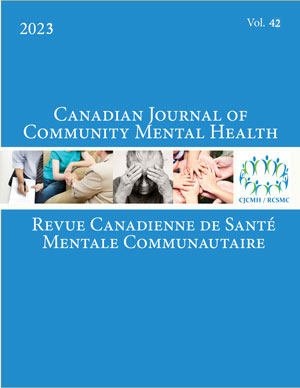Volume 40 • Number 1 • May 2021
Articles
OPEN ACCESS
Transitional employment (TE) within the Clubhouse model has been adopted across Canada and the world for its effectiveness in promoting work and recovery for persons living with mental illness. However, attempts to establish a TE program in the province of Québec have been met with numerous roadblocks. Using a qualitative phenomenological approach, this study aimed to synthesize knowledge that could inform local implementation of TE. Experiences of Montréal Clubhouse members and Canadian Clubhouse directors were examined. Member narratives identified employment-program and systemic shortcomings, while directors provided key strategies for overcoming barriers to TE implementation.
OPEN ACCESS
Positive mental health in youth has important implications for overall well-being. This study examined the extent to which different types of social support are associated with positive mental health among individuals, ages 15–24, diagnosed with attention deficit/hyperactivity disorder (ADHD). Compared to respondents without a diagnosis of ADHD, those with a diagnosis had significantly lower scores on measures of positive mental health and on four of five types of social support. Among the five types of social support, social integration and reassurance of worth were found to be significant predictors of positive mental health in respondents diagnosed with ADHD.
OPEN ACCESS
This study reports findings from an evaluation of a 3-year collaborative care pilot project implemented in a Canadian primary care setting to assess and treat seniors (age ≥ 65) living at home with a chronic physical illness and co-morbid depressed mood or anxiety. Data were collected using semi-structured interviews with seniors and family caregivers who had participated in the project (n = 14). Descriptive qualitative analysis revealed the significance of the care manager’s role in offering social and emotional connection and non-stigmatizing support to seniors living at home and self-managing their physical and mental health.
OPEN ACCESS
Worldwide, Indigenous peoples focus on being well rather than merely managing diseases and illnesses. We have elaborated on a mental wellness framework earlier developed with Manitoba First Nations (FN). This article further explores wider community perspectives in relation to the themes previously shared by FN Elders. Surveys were administered to a simple random sample of participants by household in 8 participating FN communities. We determined what resonates from the wellness framework in order to expand understanding of mental wellness in FN communities. Appropriate application of traditional health knowledge and practices may result in increased self-awareness and contribute to mental well-being in FN people.
OPEN ACCESS
There has been a significant disruption in the transmission of parenting practices across generations of Canadian Indigenous communities (Truth and Reconciliation Commission of Canada [TRC], 2015). As a result, there is a pressing need for effective and culturally appropriate programs for Indigenous parents (TRC, 2015). Review of currently available parenting programs in Canada may help by synthesizing Indigenous and non-Indigenous parenting knowledge. To that end, a scoping review of sources that described parenting programs for Indigenous families was completed using 11 databases and available grey literature. All programs integrated cultural components into treatment, though specific activities, content, and structure varied. Recommendations for clinical practice and future research are provided.
OPEN ACCESS
To develop wait time guidelines, case vignettes were designed corresponding to varying levels of clinical urgency based on an objective measure (Western Canada Waitlist Mental Health Priority Criteria). Experts provided maximum acceptable wait times (MAWT) for each vignette. Raters’ estimates of urgency aligned with the vignettes’ designed ranking. “Very high” and “high” clinical urgency cases were assigned a mean MAWT of approximately 2 weeks and a month, respectively. For “moderate” urgent cases, the mean MAWT was 3.5 months, with a MAWT over 4 months estimated for “low” urgency cases. These results may inform local children’s mental health service triage practices.
Practice Innovations
OPEN ACCESS
People with psychotic disorders are at higher risk of not completing an educational degree and tend to get low-wage jobs. We offered computer coding classes to 14 participants. The training was deemed feasible, acceptable, and appeared to increase their motivation for school or work, not only in computer-related domains.
OPEN ACCESS
Une évaluation des besoins a été menée dans un conseil scolaire francophone en Saskatchewan (issu d’une minorité linguistique) pour identifier des interventions basées sur des données probantes. Coping Cat et Incredible Years ont été identifiés dans ce conseil scolaire comme les interventions les plus pertinentes et faisables pour aider les élèves ayant des difficultés d’anxiété et de comportement. De nouvelles pratiques sont suggérées.










